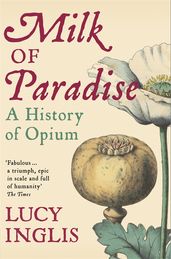Synopsis
'Lucy Inglis has done a wonderful job bringing together a wide range of sources to tell the history of the most exciting and dangerous plants in the world. Telling the story of opium tells us much about our faults and foibles as humans – our willingness to experiment; our ability to become addicts; our pursuit of money. This book tells us more than about opium; it tells us about ourselves.' - Peter Frankopan, author of The Silk Roads
‘The only thing that is good is poppies. They are gold.’
Poppy tears, opium, heroin, fentanyl: humankind has been in thrall to the ‘Milk of Paradise’ for millennia. The latex of papaver somniferum is a bringer of sleep, of pleasurable lethargy, of relief from pain – and hugely addictive. A commodity without rival, it is renewable, easy to extract, transport and refine, and subject to an insatiable global demand.
No other substance in the world is as simple to produce or as profitable. It is the basis of a gargantuan industry built upon a shady underworld, but ultimately it is a farm-gate material that lives many lives before it reaches the branded blister packet, the intravenous drip or the scorched and filthy spoon. Many of us will end our lives dependent on it.
In Milk of Paradise, acclaimed cultural historian Lucy Inglis takes readers on an epic journey from ancient Mesopotamia to modern America and Afghanistan, from Sanskrit to pop, from poppy tears to smack, from morphine to today’s synthetic opiates. It is a tale of addiction, trade, crime, sex, war, literature, medicine and, above all, money. And, as this ambitious, wide-ranging and compelling account vividly shows, the history of opium is our history and it speaks to us of who we are.
Details
Reviews
Lucy Inglis has done a wonderful job bringing together a wide range of sources to tell the history of the most exciting and dangerous plants in the world. Telling the story of opium tells us much about our faults and foibles as humans – our willingness to experiment; our ability to become addicts; our pursuit of money. This book tells us more than about opium; it tells us about ourselves.
Lucy Inglis’s fabulous book Milk of Paradise is the history of civilisation as shaped by opium . . . a triumph, epic in scale and full of humanity. Geopolitics was changed by the poppy: it influenced the development of navigation, exploration and world trade; hand-in-hand with war, it helped to create the wealthy economies, science, medicine, crime and human despair of the modern world. The poppy, she says, will always be one of the greatest global commodities for good and evil — and we will always be at war with it
As Lucy Inglis recounts in her sweeping new history of opium, the tension between the substance’s medicinal virtue and its dangers is ancient ... [She] untangles these contradictions with gusto ... a deeply researched and captivating book
Shows again and again how counter-productive prohibition is
